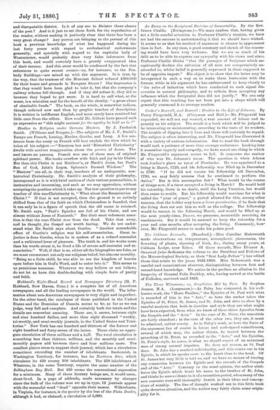The Three Witnesses ; or, Scepticism Met by Fact. By
Stephen Jenner, M.A. (Longmans.)—As Paley has compared, in his well- known work, the "form Peelings," the Epistles of St. Paul with what is recorded of him in the "Acts," so here the author takes the Epistles of St. Peter, St. James, and St. John, and tries to show by a careful analysis that both in doctrine and style they are what might have been expected, from what we know of these three Apostles from the Gospels and the "Acts." In the case of St. Peter, the materials are fairly abundant ; in the case of the other two, they are, it must be admitted, rather scanty. As in Paley's work, so here the force of the argument lies of course in latent and unclesigned coincidences, several of which may, the author thinks, be traced between the preaching of St. Peter, as recorded in the "Acts," and his Epistles. St. Peter's style, be notes, is what we should expect of an untrained man of strong natural impulses. He does not reason, as St. Paul does. St. John has a marked individuality, and this comes out in his Epistle, in which he speaks more to the heart than to the head. Of St. James but very little is told us, and we have no means of tracing any connection between his Epistle and the records of the Gospels and of the "Acts." Contrary to the usual opinion, the author attri- butes the Epistle which bears his name to the brother of St. John, and thinks he sees evidence in it of a transition period, when many of the new converts were still thoroughly Jewish in their ideas and concep- tions of worship. The line of thought worked out in this little book quite deserves attention, and the author may fairly claim some origin- ality for it.


































 Previous page
Previous page